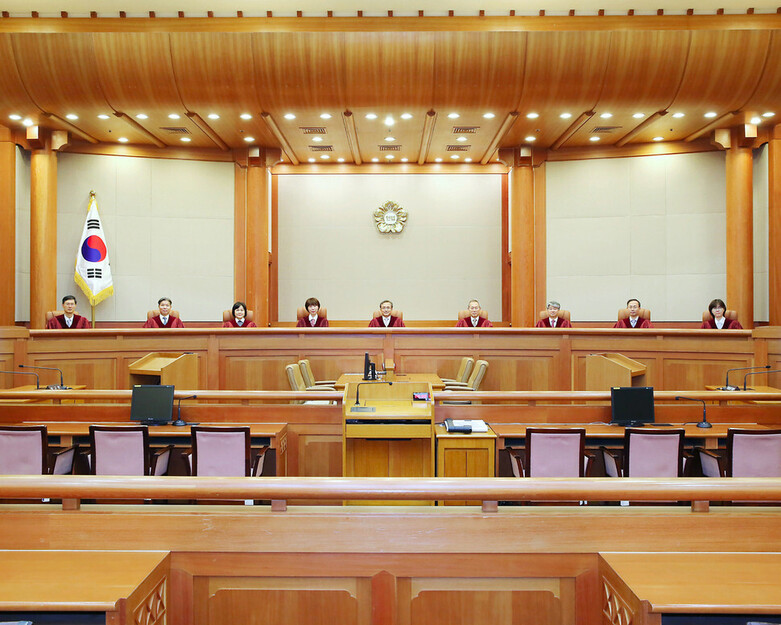Constitution, defamation, minority opinion
Pointing out the’strategic containment lawsuit’ problem’
Blockade lawsuit for silence and retaliation
Although it has been raised for many years, the legislative debate’walking’

Constitutional Court Supreme Court decision. Provided by the Constitutional Court
“With the aim of blocking surveillance and critical reporting on public figures and public matters, a’strategic containment lawsuit’ in which criminal proceedings are initiated has become possible for true and timely expression, and freedom of expression has been severely reduced.” On the 25th, the Constitutional Court of Justice 5 (constitutional):4 (unconstitutional) on the crime of defamation in fact made such a statement in a minority opinion of the four judges. It was pointed out that even though the facts were specified, there were cases of lawsuits for silence or retaliation due to defamation charges when the fact that criminal punishment could be carried out. Judges Yoo Nam-seok, Lee Seok-tae, Kim Ki-young, and Moon Hyung-bae, who gave a minority opinion, added, “As the possibility of being caught up in criminal proceedings for defamation when factually (by a strategic containment lawsuit) increases, the freedom of expression has diminished.” The problem of the strategic containment lawsuit has been pointed out again as a result of the judgment on the constitutional petition for defamation in a timely manner. Strategic Containment Litigation (SLAPP) is a lawsuit filed with the aim of suppressing the monitoring and criticism of the other party. The concept originated in the United States and has not yet been clearly established in Korea, but the legal community sees a lawsuit filed with the aim of causing pain to the other party as a strategic containment lawsuit. The state filed a lawsuit for compensation of billions of damages for citizens’ assembly and demonstration activities, a company demands compensation for damages and seizure to neutralize the strike of a labor union, and public figures such as politicians file a lawsuit against the criticism of the media for defamation. And so on. In the legal world, in 2016, the Navy claimed compensation for damages of 3.4 billion won to 120 residents and civil society officials who opposed the construction of a military base in Gangjeong Village in Jeju, and Ssangyong Motors 15 billion won to members who held a strike for 77 days in 2009. We consider the case of filing a lawsuit for compensation for damages as a representative case of a strategic containment lawsuit. Those who point to the strategic containment lawsuit point out that the lawsuit has a wide-ranging atrophy. Considering that not only the amount of claims worth billions of billions of damages, but also the lengthy and lengthy litigation process, and the fact that the person who filed the lawsuit often has the power or capital, these litigations act as a kind of’example’ to society. The result is that the whole is shrunken. Attorney Song Sang-gyo (Deoksu Law Firm), who has been raising the issue of strategic containment lawsuits for a long time, said, “Strategic containment lawsuits attack people who exercise basic rights such as freedom of expression, freedom of assembly, and three labor rights in the name of the right to request a trial. He said, “There are studies that say that the problem to be solved in the public forum is approached in a lawsuit, and the resulting contraction effect is very large.” Discussions within and outside the legal community have continued for several years that the government should regulate strategic containment lawsuits with the national lawsuit for compensation for damages against the residents of Gangjeong Village. The Supreme Court’s court administration commissioned a research service on’Strategic Blockade Litigation Countermeasures’ in April 2017, based on the awareness of the problem of strategic blockade litigation, and the Ministry of Justice also issued a government legislation in March 2019 to limit strategic blockade litigation. I will promote it.” However, there is no fruitful situation. In February 2017, some amendments to the Civil Procedure Act by Democratic Party lawmaker Ahn Ho-young and Democratic Party lawmaker Park Ju-min’s’Special Act on Harassment Lawsuits in the State, etc.’ It has not been able to come up with a new bill for the second year. Currently, the same bill that Rep. Park Ju-min is re-initiated by the 21st National Assembly for review by the judiciary is the only proposition to regulate a strategic blockade. Attorney Ji-young Yoon (Consensus of the Public Interest Human Rights Law Foundation), who was in charge of the strategic blockade litigation in the past, argued, “The talk of the strategic blockade litigation came from 10 years ago. He added that a resumption was necessary. By Shin Min-jeong, staff reporter
